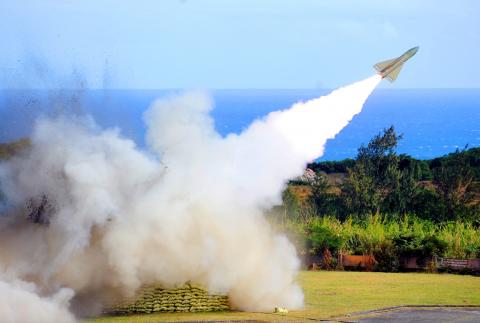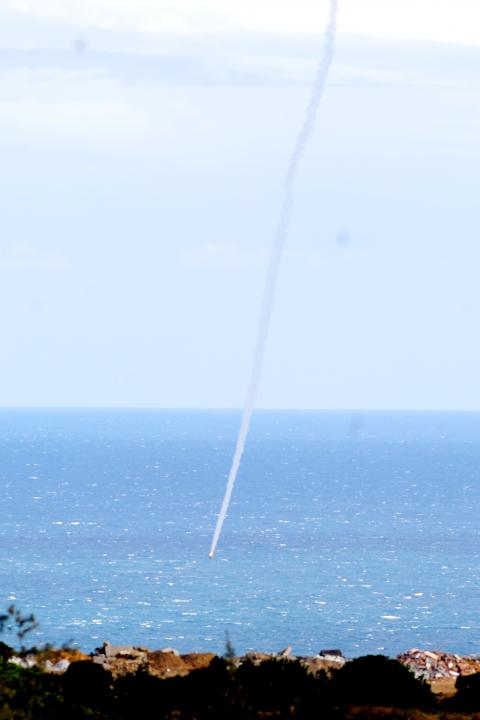President Ma Ying-jeou (馬英九) yesterday said he was “not happy” with the results of a major air defense missile test at a testing base in Pingtung County that coincided with the departure of Chinese President Hu Jintao (胡錦濤) for Washington on a state visit.
In the first major exercise open to the media at the Chungshan Institute of Science and Technology’s (CSIST) Jiupeng missile testing base in Pingtung County since 2002, three services — the air force, army and marine corps — fired 11 types of surface-to-air and air-to-air missiles, including the indigenous-made Tien Kung II “Sky Bow” (TK-II) and US-made AIM-7 “Sparrow.”
A total of 19 missiles were fired during the air defense drill.

Photo: Chang Chia-ming, Taipei Times
Months in the making and involving the participation of 576 members of the armed forces and the CSIST, the exercise showcased a number of platforms, including the F-16A/B, Mirage 2000, F-5E/F, Ching Kuo Indigenous Defense Fighter and AH-1W Cobra attack helicopter, as well as various ground-based launchers.
However, despite the impressive array, six of the 19 missiles encountered technical problems, with one Sparrow climbing about 200m into the air before radically changing direction and plummeting into the South China Sea.
Of the six malfunctions, four involved missiles coming close to their target, but failing to detonate, while the other two missed their target altogether.

Photo: Chang Chia-ming, Taipei Times
The TK-II, which has a range of 200km, performed handsomely, the military said, reportedly destroying its target at a distance of 100km. At its narrowest point, the Taiwan Strait is about 130km wide.
Air force Political Warfare Department director Pan Kung-hsiao (潘恭孝) told reporters at a debriefing that the military and CSIST were investigating the causes of the malfunctions. Early reports pointed to problems with tracking mechanisms and target acquisition.
At a press conference following the exercise, Ma, who had watched from a building overlooking the sprawling testing base located deep in the mountains, appeared unimpressed.
“I’m not satisfied with the results,” he said. “I hope the military will determine the reasons and improve its training.”
The Ministry of National Defense said an overall success rate of about 70 percent in such exercises was acceptable.
With 13 hits and six misses, yesterday’s rate was slightly short of its target, at 68.4 percent.
The exercise, which came on the heels of China’s unveiling of its J-20 stealth fighter, has given rise to speculation that its timing was no accident and constituted a response to Beijing.
Asked by reporters if the exercise was indeed meant as a countermove against Beijing’s military demonstrations or Hu’s trip to the US, Ma said the drill had “nothing whatsoever” to do with China and was intended to increase public awareness on defense issues.
Ministry officials told the Taipei Times that the timing of the exercise — the first of two to be held this year in the context of the celebrations surrounding the 100th anniversary of the Republic of China — had been set prior to the announcement of Hu’s visit to Washington or the Jan. 11 test flight of Beijing’s J-20.
The date of the second exercise has yet to be announced.

Tropical Storm Gaemi strengthened into a typhoon at 2pm yesterday, and could make landfall in Yilan County tomorrow, the Central Weather Administration (CWA) said yesterday. The agency was scheduled to issue a sea warning at 11:30pm yesterday, and could issue a land warning later today. Gaemi was moving north-northwest at 4kph, carrying maximum sustained winds near its center of up to 118.8kph and gusts of 154.8kph. The circumference is forecast to reach eastern Taiwan tomorrow morning, with the center making landfall in Yilan County later that night before departing from the north coast, CWA weather forecaster Kuan Shin-ping (官欣平) said yesterday. Uncertainty remains and

SEA WARNING LIKELY: The storm, named Gaemi, could become a moderate typhoon on Wednesday or Thursday, with the Taipei City Government preparing for flooding A tropical depression east of the Philippines developed into a tropical storm named Gaemi at 2pm yesterday, and was moving toward eastern Taiwan, the Central Weather Administration (CWA) said. Gaemi could begin to affect Taiwan proper on Tuesday, lasting until Friday, and could develop into a moderate typhoon on Wednesday or Thursday, it said. A sea warning for Gaemi could be issued as early as Tuesday morning, it added. Gaemi, the third tropical storm in the Pacific Ocean this typhoon season, is projected to begin moving northwest today, and be closest to Taiwan on Wednesday or Thursday, the agency said. Today, there would likely

DISRUPTIONS: The high-speed rail is to operate as normal, while several airlines either canceled flights or announced early departures or late arrivals Schools and offices in 15 cities and counties are to be closed today due to Typhoon Gaemi, local governments announced last night. The 15 are: Taipei, New Taipei City, Taoyuan, Tainan, Keelung, Hsinchu and Kaohsiung, as well as Yilan, Hualien, Hsinchu, Miaoli, Chiayi, Pingtung, Penghu and Lienchiang counties. People should brace for torrential rainfall brought by the storm, with its center forecast to make landfall on the east coast between tonight and tomorrow morning, the Central Weather Administration (CWA) said. The agency issued a sea warning for the typhoon at 11:30pm on Monday, followed by a land warning at 11:30am yesterday. As of

CASUALTY: A 70-year-old woman was killed by a falling tree in Kaohsiung as the premier warned all government agencies to remain on high alert for the next 24 hours Schools and offices nationwide are to be closed for a second day today as Typhoon Gaemi crosses over the nation, bringing torrential rain and whipping winds. Gaemi was forecast to make landfall late last night. From Tuesday night, its outer band brought substantial rainfall and strong winds to the nation. As of 6:15pm last night, the typhoon’s center was 20km southeast of Hualien County, Central Weather Administration (CWA) data showed. It was moving at 19kph and had a radius of 250km. As of 3pm yesterday, one woman had died, while 58 people were injured, the Central Emergency Operation Center said. The 70-year-old